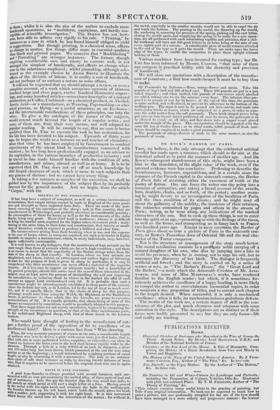DE KOCK ' S BARBER 01' PARIS. .
Tins, we believe, is the only attempt that the celebrated satirical novelist has made upon a romance which should so far aim at the historical school as to paint the manners of another age. And Dm KOCK'S subsequent abandonment of this style, might have been a hint to the translator, of the slight value of the work, even if the internal evidence were less conclusive. Professing to describe the licentiousness, humours, superstitions, and in a certain sense the romance of the French capital in the sixteenth century, the Barber of Paris fails of attaining either the exactness of truth or the poetry of fiction. One can fancy the writer one day going into a museum of antiquities, and taking a literal account of the swords, hats, doublets, cloaks, and so forth, of the period ; another morn- ing he might devote to an investigation of' the localities of Paris, and the then condition of its streets ; and he might read all about the gallantry of the nobility, the insolence of their retainers, the robberies committed by pages and others in the streets of Paris ; noting, as he went along, any indications of the marked characters of the tera. But to cook up these things, is not to enter into the spirit of an age,—presenting us with the feelings of the times, as well as tile forms, and transporting us in fancy back to France two hundred years ago. Except in mere externals, the Barber of Paris gives about as true a picture of Paris in the sixteenth cen- tury, as Rowes Tamerlane does of Oriental life and the real cha- racter of the Tartar conqueror. Nor is the structure or management of the story much better. The moral retribution consists in a profligate noble carrying off a natural daughter of his own, who dies by jumping into a lake to avoid his presence, when he is coming, not to urge his suit, but to announce the discovery of her birth. The dialogue is frequently artificial and forced ; and the story is carried on by a series of scenes or acts, as "Time Barber's House," the "Great Lord and the Barber,"—a mode which the Admirable Crichton of Mr. Airs- WORTH, and some of Miss MmernvEau's works, have rendered familiar to the English reader ; but which, it' it sometimes for-
tuitously achieves the excellence of a happy heading, is more likely to compel the author to over-elaborate inessential topics, in order to maintain a due proportion of titles, and to extend each chapter to the length desired. When successful, it is only a mechanical excellence : when it fails, its mechanism induces gratuitous defects.
The merits of the work arc, a certain degree of skill in the con- trivance of the plot, and much clearness and crispness with some animation in the style. The descriptions are as distinct as if their forms were bodily presented to us ; but they are only forms—life and reality arc wanting.


























 Previous page
Previous page